PEOPLE IN BUSINESS
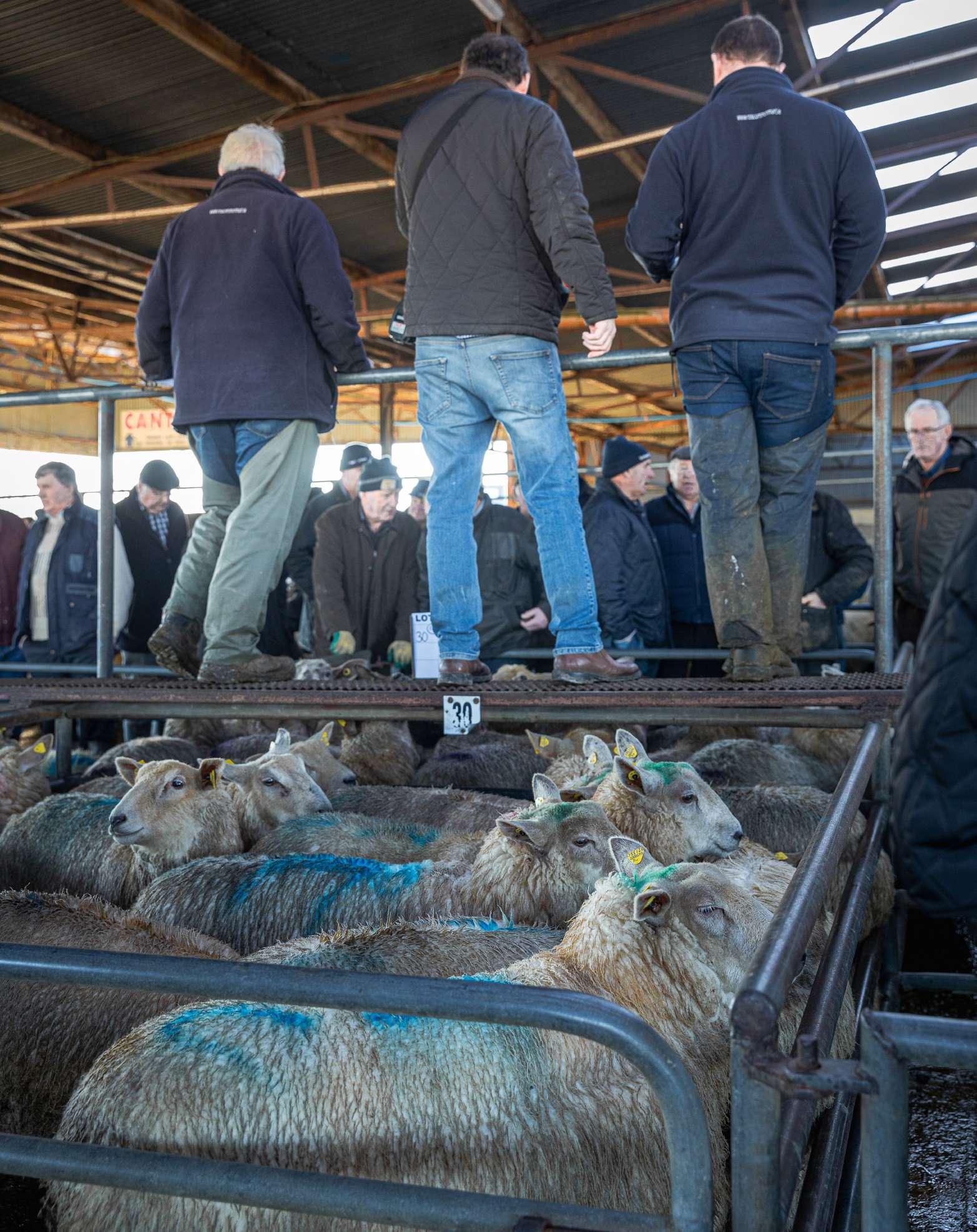


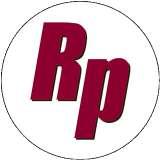

Matty Carroll, a farmer deeply rooted in Ireland’s sheep farming tradition, tends to his flock of 120 ewes alongside his father and grand-uncle on their farm in Mount TalbotDysart, Co Roscommon. Passionate about preserving the value of Irish wool, he plays a key role in the Galway Wool Co-op, a LEADER-funded, farmer-run cooperative that supplies premium wool from Galway sheep.
Following successful partnerships like the one with Donegal Yarns, the co-op is now collaborating with Avoca in Wicklow for its 2025 wool clip.

“We’re very grateful to anyone who supports us by buying our clip, and we help them in any way we can then to market the products that they make from it,” Matty explains. With around 60 members, the co-op emphasises traceability, ensuring each fleece can be traced back to its farm of origin. Shearing takes place in early summer, followed by a traditional meitheal in July to collect the year’s yield. Sourced from pure-bred Galway sheep, the wool is high-quality, cleaned, skirted, and sorted with strict standards. “We’re very strict on that but we find that the breeders and members are proactive anyway; it’s stressed that the wool has to be clean and dry, rolled and presented properly,” Matty notes. The co-op’s philosophy centres on taking pride in production to secure fair prices in return.
Once prepared, the wool is ready for scouring and spinning. However, Ireland currently lacks large-scale domestic scouring facilities, so fleeces are shipped to the UK for washing and initial processing. Mills in Bradford, England, handle scouring, while partners like Donegal Yarns use their own facilities in Kilcar, Co Donegal, and Avoca will spin the wool in-house after UK scouring. Matty is actively involved in a research project with University College Cork (UCC) exploring business models for domestic scouring in Ireland.
“We’re considering the socio-economic impact, whether it can be financially viable first of all, but if there can be local jobs and local crafts as well that might be worth supporting,” he says. Local processing could bring intangible benefits, fostering growth in wool usage.
Matty reflects on the long-standing history of the Roscommon-Galway area in sheep farming. “South Roscommon, East Galway is a sheep stronghold and it’s a pity we don’t have a way we can process our wool, and that there isn’t so much pride in producing wool as there was one time.”
The price of Irish wool is on a steady, upward trend, which is positive, however, the price is generated from a very low base. The market price for lowland wool is between 30c-50c per kilo, and it has been down to as low as 20c per kilo.
“At a low price it doesn’t incentivise farmers to look after the wool, and shear it, keep it clean and get it shown dry, pack it and store it properly”. While not blaming merchants – he praises local ones like Coffey’s in Lecarrow, Co Roscommon – Matty attributes challenges to the global com-
modity market. Optimistic about growth, he sees potential in building a stronger foundation to preserve tradition and heritage.
Though the Galway Wool Co-op is niche, tied to the Galway Sheep Breeders Association and producing 5-6 tonnes annually, Roscommon boasts its own pure-bred sheep breed and long-standing farming legacy. The Roscommon Lamb Festival once celebrated this with wool crafts, live trad music, and lamb tastings by top chefs during May bank holidays, drawing crowds until its closure in the early 2020s. Having lived in Australia until returning to Ireland in 2019, Matty missed the event but views the co-op as a model: “We produce in the region maybe about 5 or 6 tonnes of wool, but there’s a wider conversation to be had about wool in general. What we would like to be is an example to others – not even just in wool, but farmers working together cooperatively is a good way of getting better outcomes.”
Although Galway Wool Co-op is a niche group, pertaining to the Galway Sheep Breeders Association preserving the pure-bred Galway Sheep, Roscommon has a purebred breed and a long-standing history of sheep farming.
The Roscommon Lamb Festival celebrated this heritage, with wool crafts, live trad music and lamb tastings by top chefs. The festival closed in the early 2020s, but it is well remembered as an event that drew crowds during May bank holiday weekends in remembering and preserving our sheep farming tradition. Matty lived in Australia until returning to Ireland in 2019, so didn’t make it out to the festival before it was discontinued.
“Galway Wool Co-op is maybe a niche group and we produce in the region of maybe about 5 or 6 tonnes of wool, but there’s a wider conversation to be had about wool in general.
“There’s opportunities for the entire Irish grown-wool clip to be used in a range of different products as an alternative to synthetic materials”
What we would like to be is an example to others, not even just in wool, but farmers working together co-operatively is a good way of getting better outcomes”.
Amid recent calls from the INHFA for the Irish textile industry to “embrace woollen products”, the many benefits of using wool as a textile are undeniable. A renewable, sustainable, natural fibre, it supports ethical and sustainable practices, with excellent insulation, lower environmental impact, moisture absorption, and durability for longer use.
“It grows back on the sheep every year. Most sheep breeds need to be sheared every year for their own welfare. We’ve a great sheep tradition in this area, and it would be great if it was valued more” says Matty. 100% authentic Irishgrown wool offers a natural remedy to the problems posed by fast fashion and the high-use of synthetic fabrics. Synthetic clothes have a negative environmental impact, contain microplastics, and pose potential health concerns from chemicals used in production. Of poor quality and lacking breathability, synthetic fabrics contribute to a false economy: low upfront costing offsets the fact that these garments need to be replaced more often.
“There’s opportunities for the entire Irish grown-wool clip to be used in a range of different products as an alternative to synthetic materials”. Wool is a natural, non-toxic material, which has served homes and businesses in RoscommonGalway and the entire country for generations, and ought to be used more looking ahead to the future.
“If anyone is a member of the Galway Sheep Breeders Association or anyone is interested in getting involved in Galway sheep, we’re open to anyone who has pure-bred registered Galway sheep. And we’re always happy to give advice to anyone looking to set up a co-op”.
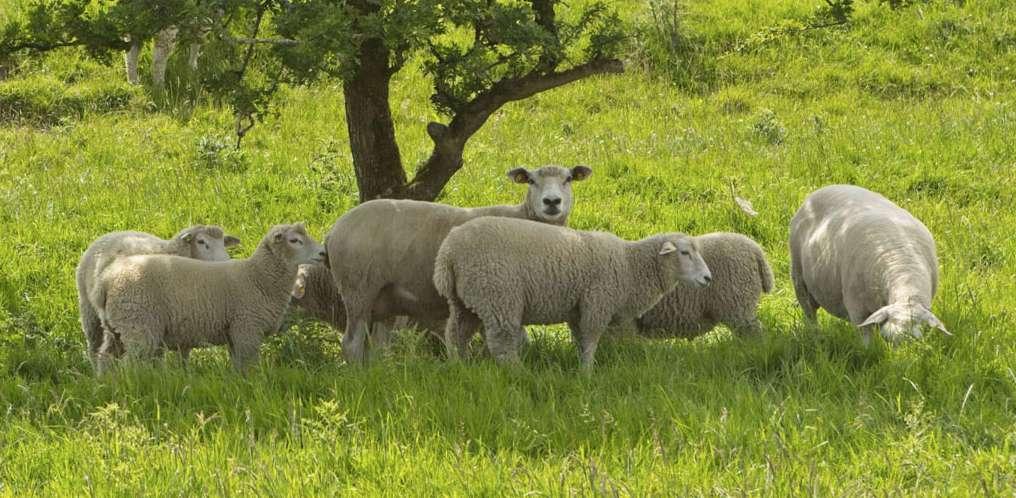

c. 49.5 acre Residential Farm
Derryhanee, Clondra, Longford, Co. Longford N39 CC67
Stunning Shannon-side
Residential farm comprising c. 49.5 acres of good agricultural land with extensive farm yard including 4 bay slatted shed with creep, modern yard and crush, 3 bay hay shed with lean-to together with traditional stone outbuildings located in a quiet scenic setting convenient to the waterside towns of Tarmonbarry and Lanesboro. This farm offers extensive shore line onto the River Shannon famed for its excellent fishing and boating. Being sold with the

benefit of 17 entitlements. The farmlands are subject to a lease until 1st May 2026. The residence comprises a modern 4 bedroom bungalow in good condition throughout with private well and new treatment plant sewage system.
NOTE: House and lands can be sold separately should market interest dictate.
Church Street, Roscommon Town, CO. ROSCOMMON
TEL: 090 6627878 FAX: 090 6627877
E-mail info@oates.ie
Website: www.oates.ie
The Manse, Northgate Street, Athlone, CO. WESTMEATH
TEL: 090 6477500 FAX: 090 6477546
E-mail athlone@oates.ie
Website: www.oates.ie

Teagasc has launched its National Farm Survey (NFS) Farm Enterprise Data Dashboards, a new online tool to provide farmers, advisors and policymakers with clear insights into the economic performance of Ireland’s main farm enterprises.
The Dashboards present key farm population data in an accessible format, making it easier than ever to track performance across Irish dairy, cattle, sheep and tillage enterprises. Users can quickly explore data on output prices, production costs, profit margins and aspects of farm enterprise technical performance. With over a decade’s worth of data included, users can make comparisons across enterprises as well as reviewing trends over time.
Teagasc has also published its Farm Enterprise
Factsheets for 2024, providing insights into the financial and technical performance of a range of farm enterprises. The data behind the Enterprise Factsheets and the Dashboards come from farms participating in the Teagasc National Farm Survey. A series of further Dashboards are due for release in the coming weeks, covering fertiliser use, farm sustainability and other key agricultural data. The launch coincides with the publication of the final results of the 2024 National Farm Survey. The Farm Enterprise Dashboards and the Teagasc Enterprise Factsheets for 2024 are now available to view at https://teagasc.ie/publications/nationalfarm-survey-enterprise-factsheets-

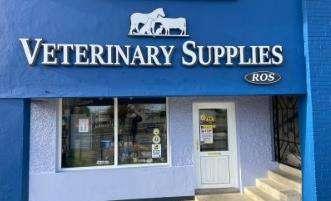







A commitment to quality underpins the role of the mart, while it’s also a social hub and a key employer

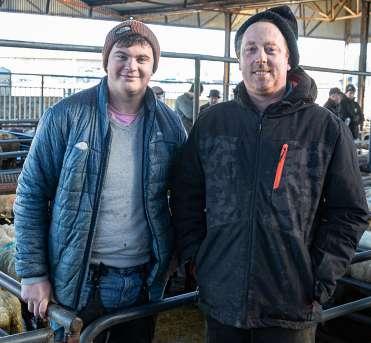
< EMMA HEALY
Roscommon Mart, located on Circular Road, Roscommon, has been a sales venue and meeting place for farmers for 66 years. The mart has not only hosted livestock trading but also facilitated conversation and camaraderie within the farming community.
Tony Conry, Manager of Roscommon Mart, reflected on the current vibrancy of the market when he spoke to the Roscommon People this week.
“This is a very busy time of year. The price(s) of cattle and sheep at the moment are very good, so farmers are getting a just reward for producing their cattle and sheep. It’s developed as a good year for farmers, and farmers seem to be happier and more content.”
Although it is generally an active time of year, Tony noted the significant uptick in activity, stating, “All our numbers and metrics are up this year, thank God.”
Despite a 3.9% national decline in the cattle herd, Roscommon Mart remains resilient, with strong returns for livestock and a positive business outlook. The mart’s continued recent success, particularly in trading weanlings and heifers, is evident in a robust show and sale featuring 600 calves, alongside regular sales of bullocks and heifers every second Friday, drawing around 500 cattle each time, and weekly lamb and cast ewe sales every Wednesday.


Reflecting on the broader impact, Tony emphasises the mart’s role in restoring confidence in the suckler industry: “Farmers weren’t getting the just rewards for the animals they’re producing. With the change in business in the last twelve to eighteen months, farmers in Roscommon and the West of Ireland have a renewed sense of confidence.”
He observes that more farmers are now “holding onto their cows and breeding a few more calves, which will hold our numbers going into the future.”
Quality assurance underpins the mart’s operations, with all livestock certified through Bord Bia and the Department of Agriculture’s blue-card system. Tony explains, “Naturally, the higher the standard within the farming community would be the farmers who are registered, quality assured, as there’s certain farmers and breeders who will only buy from quality assured sources – it can be the difference between 20c or 30c/kilo in relation to some animals.” This commitment to quality strengthens the mart’s reputation and ensures better returns for farmers. The advent of online platforms like MartEye has revolutionised accessibility, particularly for part-time farmers. Tony describes it as “a game-changer for all marts – the ability to log on and purchase your animals online.” This increased buyer access, he notes, “creates a little more competition, and naturally more competition is healthy for the industry.”
The mart’s embrace of online sales ensures swift and secure transactions, with payments made within three to five working days and prices locked in at the hammer’s fall – guaranteed. Beyond commerce, Roscommon Mart is a vital employer and community anchor, supporting six full-time and 20 part-time staff,

alongside indirectly sustaining hundreds of local jobs. Its weekly sales schedule – running Tuesdays, Wednesdays, Fridays, and Saturdays – keeps the mart lively with activity. Yet, its significance extends beyond economics.

“We have a canteen here, and some of our senior farmers would come in on a sales day to chat and have a cup of tea,” Tony shares. For younger farmers, the mart is a learning hub where they can “engage and talk to peo-
ple, see what they’re doing, and pick up ideas.”
Highlighting the social value the mart brings, Tony says: “It’s a social outing, and we feel that’s very important, and we’d like to continue that for as long as we possibly can.”
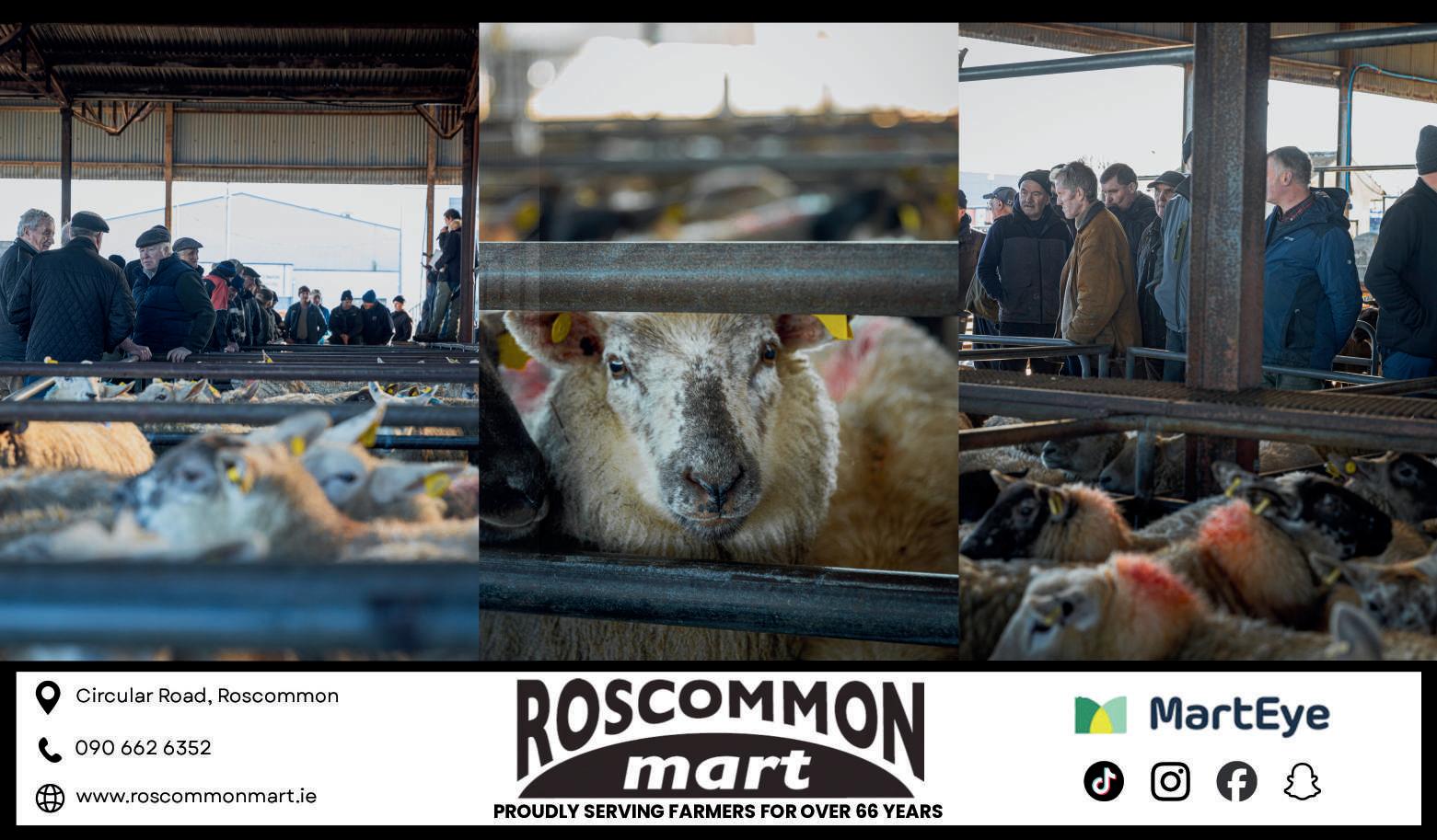



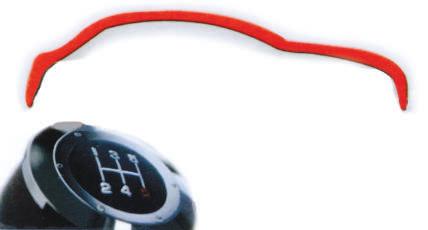
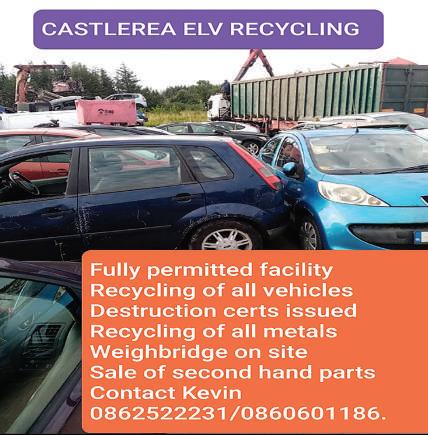

County Roscommon and Galway communities are invited to take part in special community events on Saturday, October 18th, as part of a nationwide conversation on shaping Ireland’s Nature Restoration Plan (NRP). Ireland is at a turning point as nature faces increasing pressure. The new EU Nature Restoration Law (NRL) sets an ambitious target: to restore at least 20% of the country’s land and sea areas by 2030. Achieving this goal requires more than just policy; it needs people, communities and meaningful dialogue.
To ensure the plan truly works for both people and nature, ACT and Hometree are hosting Community Conversations across Ireland. This collaborative project aims to give people a chance to help shape Ireland’s 25-year Nature Restoration Plan. Discussions, workshops, and walks will take place in all provinces, bringing communities together to share their stories, ideas and lived experiences.
The next event, taking place on Saturday, October 18th, will be held in
Ballyforan, Co Roscommon. The day will begin with a bog biodiversity walk hosted by the Hometree ecology team. Attendees are asked to meet at the entrance of the greenway at 11 am.
Later in the afternoon, people are invited to join Community Conversations Workshop from 4 pm to 6 pm at the St Aidan’s GAA Hall. This open, engaging and inclusive event will give community members the opportunity to share their thoughts, concerns, and ideas about the future of Ireland’s natural environment and to learn about the process of developing Ireland’s NRP. It will be facilitated by independent delivery partners, Hometree and ACT, who will feed the outcomes and insights back to the Independent Advisory Committee on the Nature Restoration Plan. The event is free, and everyone is welcome – please note no sign-up is necessary.
Individuals and communities are warmly invited to join the conversation. Your voice and your community matter. Together, we can shape Ireland’s future with nature at its heart.


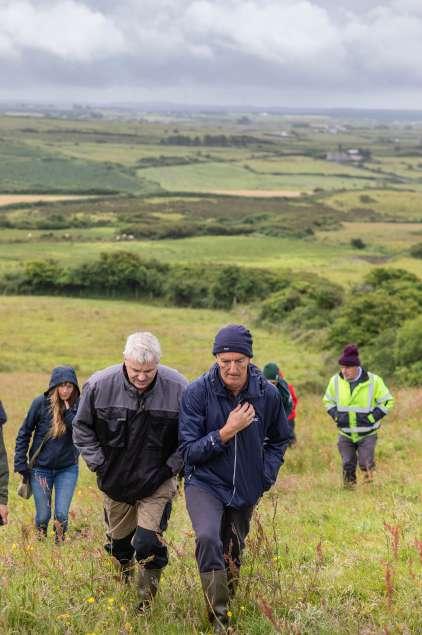




Preserving tradition while embracing versatility in eggs, poultry, and local produce
< EMMA HEALY
Ray Gannon is a fourth-generation proprietor of Gannon’s Eggs and Poultry – the oldest continuously operating egg and poultry business in Ireland, founded in 1875. From freerange flocks to setting up farm shops with traceable, Bord Biacertified food, Gannon’s Eggs and Poultry’s story is one of unyielding commitment to quality produce amid the changes of modern agriculture.
Ray’s poultry farm, located on the Croghan-Frenchpark Road at Carrick-on-Shannon, has stood firm “through the good times and bad times, passed down through the generations. The job has changed a lot over the years but still the chicken and the egg is the basic, startoff ingredient for many home dishes.”
The versatility of chicken, and the protein-benefits of eggs, is something many households rely on daily for nutritious, energising meals. “Chicken goujons,
of poultry farming, Ray Gannon of Gannon’s Eggs and Poultry knows all too well that the job never ‘clocks out’. “It’s a 7-day week cycle, Saturday or Sunday it makes no difference, Christmas Day, New Year’s Day; the show goes on”, he says, as the chickens need constant care.
The working day begin at 7 am, and involves constant shuttling between chicken sheds to monitor feed levels, water supply, and temperature controls. Mornings centre on egg collection, while afternoons shift to grading, sorting into various packs and sizes, and packing. This amounts to a true 24/7 commitment across all 365 days.
“No day off for the hen or the chicken, you’re on call, complete attention to detail and commitment to the welfare of the stock (is required)” Ray said.
Gannon’s Eggs and Poultry has a broad range of eggs, from premium organic options raised on chemical-free feeds to free-range varieties where hens roam outdoors, and reliable barn-fed eggs from sheltered,
with heavy soil structure and the milder climate.
Gannon’s Eggs and Poultry has two locations, one on the Croghan Road in Carrick-onShannon and the other being a prominent location in The Square, Roscommon Town. “Trade has been good in Roscommon” Ray says. “We initially started in a mobile (unit) in the Square every Saturday, and then got the opportunity about five years ago to lease the premises we have now, and we took the plunge and moved in and are now able to offer a more comprehensive package, as it’s now more comfortable for us and for customers on a windy, wet day, which was a bit of a struggle at times”.
Ray’s family all help out on the farm and at the shop in Carrick, and Mary Gilligan manages the Roscommon premises. “We’re lucky to have Mary, she’s been with us a few years now and she’s very capable and knows all the customers”.
Beyond eggs, Gannon’s poultry products include popular meats such as chicken, turkey and duck. “We have quite a nice product available, Silver Hill duck, as full duck or in fillets – a nice alternative. Turkey isn’t for everyone” he says, acknowledging of course that it remains by far the most popular option at Christmas.

“Duck is a nice alternative and people like to be more adventurous sometimes and try a bit of duck, which also has great health benefits, being high in protein but low in fat”. As well as meat, Gannon sells locally sourced vegetables.
“We do our best to source as much local products as we possibly can and have a range of foods across the board, from the milk to the bread, to the local honey, Leitrim cheese, anything that’s in season and is local, free-range or organically produced. We’re always eager to have something a bit different compared to what you might get in some of the bigger stores”.
From his experience sourcing and selling local, fresh produce, Ray says: “There’s some great,
fantastic farmers around the region. You can source nearly any product you want within the three counties of Sligo, Leitrim and Roscommon, and there’s some fantastic growers and producers we work with. We’ve tried to support as much local produce as we possibly can, with over 50 suppliers within the three counties.” Ray employs about 15 people in Roscommon, and the business prides itself on being local and supporting local.
“All our services are sourced within the three counties around us, be it from fuel suppliers, to
paper suppliers, garage centres or tyre repair, anything we use within our business, we pride ourselves in (being) local first”. Gannon’s do their best to give back to the local community, sports teams and projects through sponsorship and giving back to community organisations. “You also need the support of your local organisations, so it’s all about keeping the euros in the local community. We’re very happy to be trading in Roscommon. We get on well very well with the people of Roscommon, we’re nearly fifteen
years there and it’s a fantastic town to do business in”. *The Roscommon shop is open Fridays and Saturdays from 9 am-5 pm on Allée de Chartrettes, The Square, Main St, Roscommon.
“The chicken and the egg is the basic, start-off ingredient for many home dishes” “
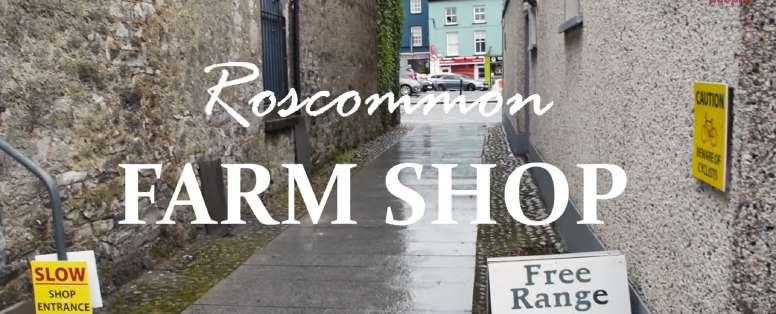






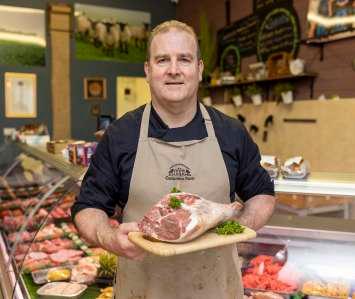

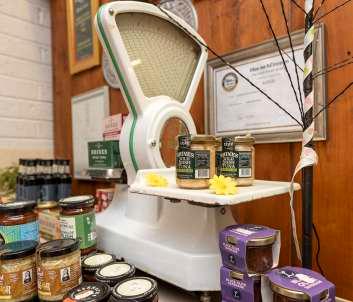




Farm-to-fork enterprises are proving that going local is a recipe for quality, flavour, and economic vitality. Derek Allen, who runs Castlemine Farm – a fifth-generation business – and Alan Gilligan of Gilligan’s Farm are two Roscommon stalwarts turning pasture-fed beef, lamb, and more into direct-to-consumer meals.
The benefits of opting for local produce instead of imports are clear. Derek from Castlemine elaborates: “It’s the taste and the quality. Anyone that slaughters their own cattle for use – it’s a totally different product than what factories do, which is what supermarkets get. We hang our meat for three weeks, on the bone; it’s a totally different flavour and a totally different meat. That’s what people look for.”
Alan from Gilligan’s shifts the focus to broader ripple effects. “If customers can support local suppliers, it’s keeping business in the locality, keeping jobs in the locality. I think food standards are very high anyways in our country no matter where you buy it. There’s a lot to be said for supporting the small, local family-run businesses, now more than ever. Our food system and supply chain is very much focussed on big supply chains into the larger, multiple supermarkets... We really don’t want to lose quality, our local artisans and producers; it’s really important that they are supported where possible.”
Sourcing straight from Roscommon farms like these does more than secure quality ingredients
and add flavour to meals – it brings life into the local economy and lowers unnecessary waste. Derek highlights the employment boost and community giveback at Castlemine.
Asserting that major multinationals are less likely to directly sponsor causes, Derek emphasised that “local people” invariably support clubs and organisations in their locality.
“It’s always the local people who end up doing all that. When we had the farm here, it was just myself and my father on it, two families, but now we’ve ten staff, so there’s a lot more employment.”
Alan echoes this sentiment on striking a balance when sourcing local food: “Balance is important. And food waste is a huge thing as well. With food being so expensive right now, there’s no reason to be wasting any food. Batch cooking is always something handy for people who are ‘time-pressed’. We’re very lucky with all the accoutrements we have now in our kitchens with slow cookers and air fryers... I think people need to have a bit more respect for their food as well.”
Behind the scenes, the daily bustle never ends!
At Castlemine, Derek describes the busy routine that keeps the farm going: “Every day is busy; we’ve got a lot going on here. We slaughter cattle every week, obviously, for the shops. It’s a different style of farming... we’re slaughtering every week, so there’s cattle to be fed every morning and we’ve such a range of stuff too,
beef, sheep, we’ve four hundred turkeys there for Christmas... and we have a few pigs as well. So you’ve a good few hours every day just to get around to everything before you do anything else.”
To reach customers far beyond Roscommon, both Castlemine and Gilligan’s offer nationwide delivery via DPD in temperature-controlled boxes, ensuring that farm-fresh pasture-fed beef and lamb arrive in the best possible condition. For home cooks who are always looking for ways to elevate their meals, practical advice abounds. Derek advises simplicity and resourcefulness: “Buy good quality and you won’t have any waste; there’s nothing worse than a bad piece of meat that ends up tough. Cook roast beef and have sandwiches the next day, or leftover chicken roast in a soup. Make the most out of what you have.” Alan encourages creativity and planning: “Be creative. There’s so much recipes online these days... Buy what you need and buy what you enjoy. Maybe make a weekly plan if you’re getting bogged down with waste... Support local when you can... There’s always options online as well. There’s loads of smaller, artisan producers selling online and you can buy directly off them.”
Businesses like Castlemine and Gilligan’s are sustaining traditions through shorter supply chains – and reminding us that every purchase can strengthen the fabric of rural Ireland.
ACORNS, the business development programme for female entrepreneurs in rural Ireland, is this week celebrating after being nominated for honours at the European Enterprise Promotion Awards.
The initiative has been shortlisted at European level in the Investing in Entrepreneurial Skills category. It had already been selected as Ireland’s national entry
to the awards earlier this year.
The overall winner will be announced at a prize-giving event at the SME Assembly in Copenhagen in November.
The SME Assembly is the most significant event for small and medium-sized enterprises (SMEs) in Europe. It takes place once a year as part of the European SME Week. The SME Assembly is a Europe-wide event for SMEs and
entrepreneurs and those who support them.
ACORNS is a free initiative for early-stage female entrepreneurs based in rural Ireland. It has been running since 2014 and is funded through the Rural Innovation and Development Fund by the Department of Agriculture, Food, and the Marine (DAFM).
The recruitment and selection process has just been completed, with
more than 50 new participants set to start ACORNS 11 this month.
ACORNS is based on the belief that early-stage entrepreneurs learn best from their peers. Participants interact with each other in the monthly round table sessions, which are facilitated by a Lead Entrepreneur, who has first-hand experience of starting and successfully growing a business in rural Ireland.



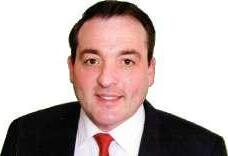



ACORNS, the business development programme for female entrepreneurs in rural Ireland, is this week celebrating after being nominated for honours at the European Enterprise Promotion Awards.
The initiative has been shortlisted at European level in the Investing in Entrepreneurial Skills category. It had already been selected as Ireland’s national entry
to the awards earlier this year.
The overall winner will be announced at a prize-giving event at the SME Assembly in Copenhagen in November.
The SME Assembly is the most significant event for small and medium-sized enterprises (SMEs) in Europe. It takes place once a year as part of the European SME Week. The SME Assembly is a Europe-wide event for SMEs and
entrepreneurs and those who support them.
ACORNS is a free initiative for early-stage female entrepreneurs based in rural Ireland. It has been running since 2014 and is funded through the Rural Innovation and Development Fund by the Department of Agriculture, Food, and the Marine (DAFM).
The recruitment and selection process has just been completed, with
more than 50 new participants set to start ACORNS 11 this month.
ACORNS is based on the belief that early-stage entrepreneurs learn best from their peers. Participants interact with each other in the monthly round table sessions, which are facilitated by a Lead Entrepreneur, who has first-hand experience of starting and successfully growing a business in rural Ireland.














In an era where upland farming grapples with biodiversity mandates and economic pressures, Roscommon’s Regenerating the Rocks EIP (European Innovation Partnership) stands out as a pragmatic model. Led by the Karst Farming Network, this initiative aims to protect traditional karst grasslands while keeping local farms afloat – proving that conservation needn’t come at the expense of livelihoods.
As Ireland’s uplands face rewilding debates and scrub takeover, projects like this remind us that farmers are the original environmentalists. Born from “local concern over the loss of traditional grazing and scrub encroachment,” the EIP builds on the Uí




Maine Kingdom group’s groundwork, aiming to unite farmers, ecologists, and community members. Its core goals include: support peer learning, tackle invasive cotoneaster, assess restoration economics, and elevate cultural-ecological value through arts.
Tailored Karst Farming Plans reward farmers for blending productivity with preservation. The project team comprises of Eoghan Finneran (Director), Liam Kildea (Farmer Champion), Linda Gilsenan (Ecologist), Kelsey Daly (Coordinator), Nicola Bowes (Art & Events), and Nicola Auchmuty (Admin). Their trials of using “GPS animal collars known as virtual fencing collars” to target scrub grazing, is aimed at making it easier for farmers to manage livestock grazing in Karst terrain. Controlled grazing helps promote native plant growth and stops scrub encroachment, which is helped by active grazing
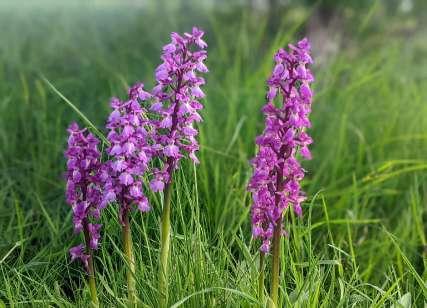
and the removal of invasive scrub.
“Farming on the rocky karst terrain is challenging due to steep, rocky land, limited water, and labourintensive work. With Ireland’s older farming population, younger generations often lack experience and skills in managing these unique landscapes. We aim to document the work and best management practices of this land for future generations,” says Kelsey Daly (Coordinator).
The project supports farmers with capital investments like rainwater harvesters and solar pumps to improve water access.
Invasive species such as cotoneaster are managed through Meitheal days, where farmers work together to clear scrub, build walls, and share skills. These efforts help maintain the landscape, reduce labour demands, and foster a community of farmers supporting each other.
“The project is strongly
focused on building farmer capacity, strengthening community knowledge, and fostering long-term empowerment. Our ecologist works with local schools to teach children about native plants and biodiversity, while Celtic Eye connects the wider community to the karst through art, history, mythology, music, and cultural traditions,” Kelsey continued.
“Often compared to the Burren but less well known, Roscommon’s karst deserves recognition, and over the four-year project, we aim to involve more schools and agricultural colleges, highlighting how farming, tradition, and biodiversity are uniquely intertwined here.”
Farmers with karst landscape habitats are invited to get involved by contacting the project team at 089 203 2702. Follow The Karst Farming Newtork on Facebook for updates.
Ifac says the record livestock prices present plenty of opportunities for Roscommon farmers to make smart investments for the future.
“Suckler and beef farmers are currently receiving higher prices than ever before for their livestock sales, both through the live trade and through beef prices received from processors. While these profits are longoverdue recognition of years of investment and dedication, they bring new challenges: higher income tax bills, regulatory demands, and decisions on how best to invest for the future,” said Trevor Boland, Senior Accountant at ifac
“In some cases, weanlings and finished cattle are making €1,000 per head more than last year and, for an average suckler farmer selling 10 weanlings, this is leading to €10,000 extra income in the bank account. Where total sales for the year are up €20,000 on a 20-cow herd, the additional income could lead to an additional tax bill of up to €10,000 for the farmer paying income tax at the marginal rate.
“Farmers now need to be aware now of what their farm profits are for 2024, what tax is payable on these profits and perhaps more importantly,what the likely farm income is going to be for 2025. Many farmers in the past would look at income tax filing deadlines as a target and not need to worry about a tax bill, as quite often many, particularly farmers with off-farm income, found themselves with a low tax bill or indeed a refund.
“For farmers looking at 2024 figures and expected income for 2025, there are possibilities to reduce income tax bills, invest in the farm for the future, invest in family and make the farm a safer place to live and work.”
Farmers are urged to take proactive steps now, including:
• Stock Relief: Leveraging 25 – 100% allowances on rising livestock values.
• Family Wages: Formalising support from family members to reduce tax liabilities while supporting education and living costs.
• Income Averaging: Spreading income tax burdens over five years to ease cashflow pressures.
• Pension Contributions: Using record profits to strengthen retirement savings and reduce preliminary tax exposure.
Investing in the Farm &
With profits at record levels, 2024/25 is the time to reinvest strategically. Farmers should consider:
• Improving safety and handling facilities to future-proof operations.
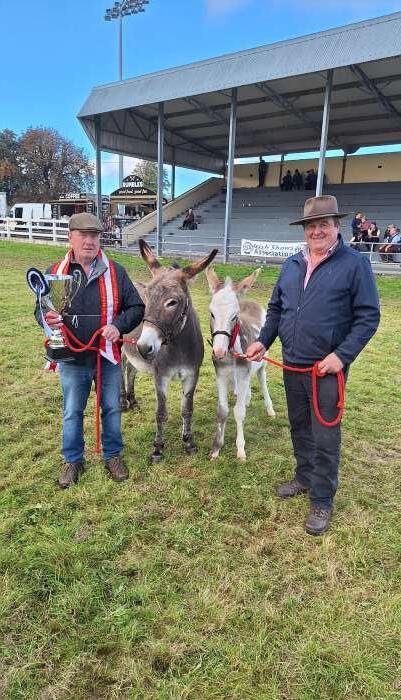
• Preparing for slurry storage and regulatory changes.
• Applying early for TAMS grants and accelerated capital allowances to offset investment costs.
The latest insights emphasise that managing higher profits is not just about tax. Strategic financial planning – including pensions and succession – will determine whether farms can support future generations.
“One in five farmers cannot currently afford to retire, underscoring the urgency of forward planning,” said Trevor.
“These profits are the result of many years of breeding and improving the farm’s performance. With the hard work and profits managing your tax cashflow is incredibly important. Suckler and beef farms will have tax to pay this month (October), so you need to get working, get your tax figure and understand your options, then plan for 2025.”
*With its growing 30-office footprint, today ifac boasts a dedicated team of 580 professionals supporting almost 30,000 clients across the country. This includes supporting 18,000 producers, 3,000 clients in the agri-food sector, and 7,000 SMEs with a full suite of professional services, including accounting, tax, audit, corporate finance, consultancy, corporate recovery, payroll, financial planning, company secretarial, and business valuations.




Kepak Road, Athleague, Co. Roscommon Phone: 090 66 63738. Mobile: 086 8963620
• email: adrian@keegantractors.com

KEEGAN FEEDS ARE NOW AGENTS FOR J GRENNAN & SONS (NUGGET DOG FOOD)

• Stone • Sand & Gravel
• Topsoil • Readymix • Plant Hire
KEENEST QUOTES CALL 071 96 33222 E: wardbrosltd@gmail.com



< EMMA HEALY


In County Roscommon, over 70% of farms specialise in beef production, primarily suckler systems, supporting a regional cattle herd of approximately 50,000 animals. Roscommon’s limestone-rich grasslands and around 6,500 beef-focused farms contribute to Ireland’s status as the EU’s top beef exporter and the world’s fifth-largest, with net exports reaching 492,000-509,000 tonnes worth €3.05-3.1 billion in 2024, over 90% destined for the UK and Europe. Yet, as 2025 progresses, the EU-Mercosur trade deal threatens to undercut this vital export sector. The agreement, sealed in December 2024, opens EU markets to Brazil, Argentina, Uruguay, and Paraguay, offering a 99,000-tonne quota of high-value beef cuts at 7.5% tariffs. In return, lower tariffs apply for EU cars and chemicals entering South America. While it may be a monumental deal which has been in the works for twentysix years, EU opposition to it has mounted on the basis of food safety. Ciaran Mullooly MEP (Independent Ireland, MidlandsNorth-West) says, “For a number of years, there have been concerns about the use of illegal animal growth promoters in South American countries”. These are banned in Ireland as the use poses a risk to food safety. Although the argument has been made that Mercosur beef must comply with hormonefree certification requirements, Mullooly says evidence has been found from the European Commission’s auditors in South America in 2024, examining the imports that already enter the EU (up to 100,000 tonnes), that consignments of beef had been infiltrated with growth promoters. Mullooly says High Court affidavits were sworn by Brazilian officials in Rio de Janeiro that no such chemicals were being used, which the EU Commission found to be false, and will not accept the affidavits, “which is symbolic of the breach of trust”.
A bombshell admission from EU Trade Commissioner Maroš Šefčovič has intensified fears.
Responding to Independent Ireland
TD Michael Fitzmaurice, Šefčovič conceded Irish beef prices could plummet 45% over five years – a 9% annual drop – without triggering Mercosur’s
safeguards. Fitzmaurice called it a “lack of a protective handbrake,” warning, “Under this trade deal, the price of beef could drop by almost half while South American beef would be allowed to flood the market – it is confirmation that this deal would decimate the Irish beef industry.” He added, “It’s utterly reckless to think this would be anything other than a disaster for farmers.”
The European Commission downplays the impact, capping imports at 1.5% of EU beef and touting an “emergency brake.”
The Commission has previously said that in the event that cheaper Brazilian beef imports come in and the Irish beef market dies (goes down by 10%), the Commission will stall the market. However, when asked by Mullooly if it was to go down by 6%, or 8%, no safeguarding action would be taken.
A Government report projects a 0.08% dip in Irish output, offset by €1 billion in gains for whiskey and pharmaceuticals. But for Roscommon, where median farm output is €10,929, these assurances ring hollow.
Live exports – to Spain, Italy, and Northern Ireland – hit record levels in 2025, yet a 3.9% national herd decline tightens supply.
The beneficiaries in this deal, from an EU perspective, would be car manufacturers, an industry Germany has interests in growing.
“They want to sell cars – and we are saying you cannot sacrifice the good name of farming, and food quality and standards, just for the sake of selling cars.”
This raises a question: Should Ireland, with Roscommon’s beef-centric model – unlike finance-driven EU nations like Luxembourg – prioritise greater influence on or alternatives within Brussels’ trade deals over uniform EU approaches? The EU’s common agricultural policy has buttressed farmers since 1962, the IFA warn Mercosur could cost Ireland €100-130 million in beef revenue due to cheaper imports displacing premium
EU beef. Could a bilateral push protect rural Ireland’s premium beef without risking market saturation from non-compliant imports?
Ireland, as an EU member, must adhere to common trade policy, which greatly limits unilateral national trade strategies. However, it can (and does) influence via Council votes, as seen in opposition to Mercosur alongside France, Poland and Austria, and some support from Italy. “Italy is split – they have a very decent farming industry but they also have a significant car industry in another part of the country”. The last vote on Mercosur, in January 2025, voting for an amendment to halt the deal, was lost by 55 votes. Approximately 85 MEPs didn’t vote. A lot of those MEPs were Italian, and discussions continue with Italian representatives to see if their support can be gained, which Mullooly is optimistic about. The next vote on Mercosur will most likely take place on the second last Thursday in December.
MEP Mullooly has voiced strong opposition: “Thousands of Roscommon farmers will lose out in the new Mercosur proposal.” He welcomes Irish Agriculture Minister Hayden’s rejection but warns against abandoning principles, stressing Ireland’s “proud agricultural tradition” and food quality. Mullooly dismisses dairy and drinks benefits as “highly dubious,” citing Numbeo data from August 2025 showing Irish cheese at $11.31 per kilo versus $8.73 in Brazil and $6.73 in Paraguay – up to 40% cheaper, rendering exports unviable. Reacting to Šefčovič’s admission, Mullooly called it the “final nail in the coffin,” adding: “Irish farmers are now being told that prices can collapse year-on-year before any so-called safety net is applied – that is not protection, it is surrender.”
He urges the Tánaiste to block the deal at the Council of Ministers for Trade under Qualified Majority Voting, declaring: “The time for indecision is over... Will he back Irish and European farmers by rejecting this deeply damaging agreement?”
Fitzmaurice and Mullooly demand the Government “wake up before it’s too late,” warning that if the deal passes, “farmers will not forgive Fianna Fáil and Fine Gael; the industry will be decimated and that will be on them.” Mullooly claims if the Irish Government goes ahead with the deal, or it is not opposed with enough votes in the EU parliament, “After a buoyant Irish beef industry trade in recent years, it will collapse. The trade in the factories and the marts will die, and the Fianna Fáil and Fine Gael government of Micheál Martin and Simon Harris will be to blame because they have not done enough”. Roscommon’s fields deserve more than EU vetoes. A tailored trade approach could preserve the county’s grass-fed legacy and high-quality exported beef, ensuring young farmers stay on the land. Without it, a vital component of Ireland’s export engine risks faltering, threatening communities that have fed the nation for generations.


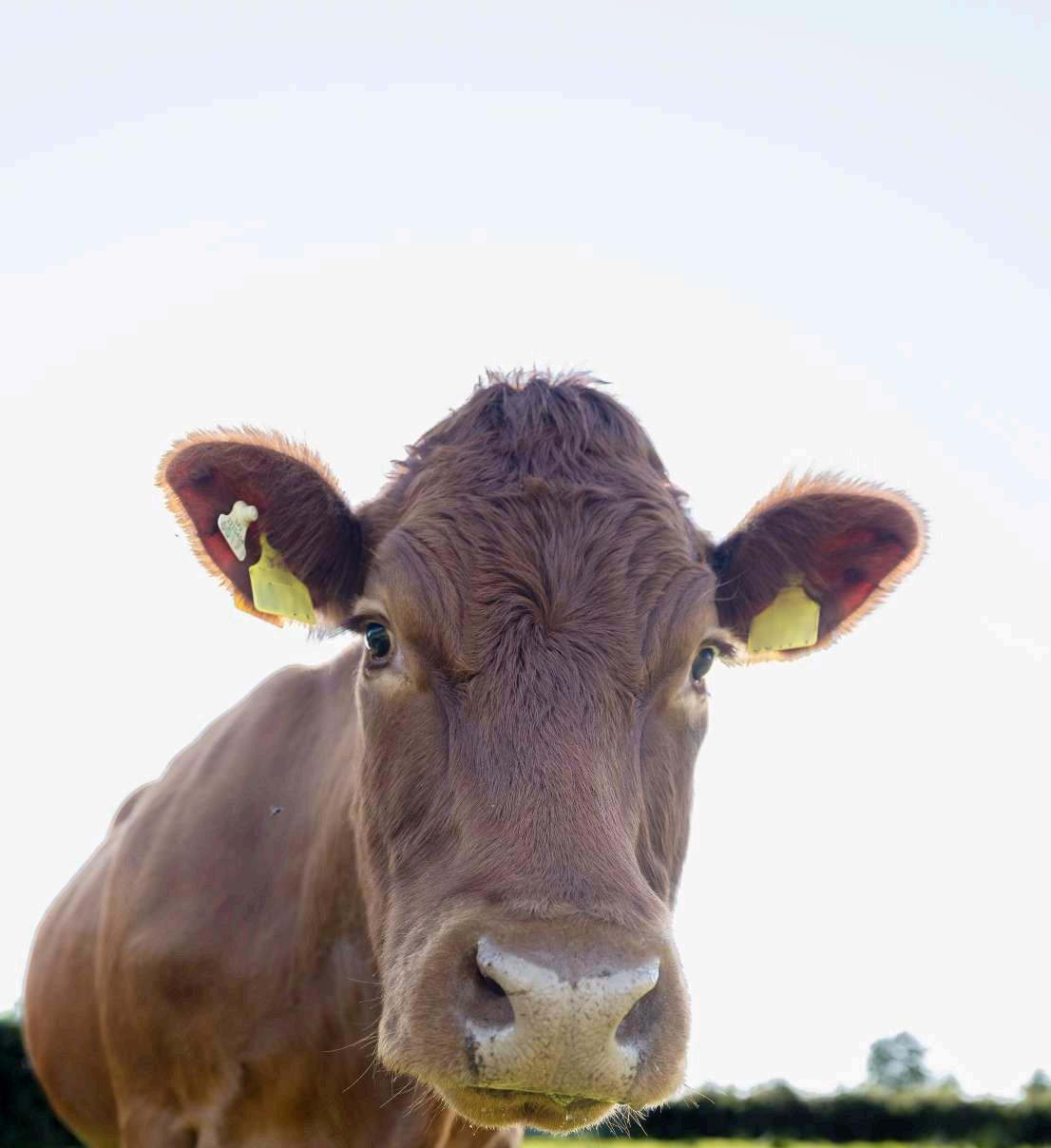
Minister ‘Boxer’ Moran and the Office of Public Works (OPW) have announced the approval of Westmeath County Council’s application for funding under the Office of Public Works’ Minor Flood Mitigation Works and Coastal Protection Scheme. Under the scheme, the OPW has approved funding of €18,000 for proposed works which include the installation of a 300mm drainage pipe and gullies to alleviate pluvial flooding at Garrynafela, Athlone, Co Westmeath.
The Minor Flood Mitigation Works and Coastal Protection Scheme was introduced by the Office of Public Works in 2009. Since then, eight funding applications by Westmeath County Council have been supported under this scheme.
The purpose of the scheme is to provide funding to local authorities to undertake minor flood mitigation works or studies to address localised flooding and coastal protection problems within their administrative areas. The scheme generally applies where a solution can be readily identified and achieved in a short timeframe. Under the scheme, applications are considered for projects that are estimated to cost not more than €750,000 in each instance. Funding of up to 90% of the cost is available for approved projects. Applications are assessed by the OPW having regard to the specific economic, social and environmental criteria of the scheme, including a costbenefit ratio.


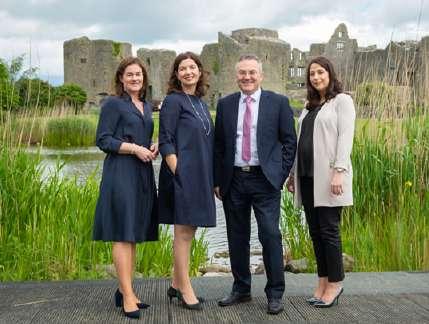
A Fine Gael senator is calling for the fast-tracking of the Electricity (Supply) (Amendment) Bill 2025, following recent widespread power outages across the west in the aftermath of Storm Amy.
Senator Gareth Scahill said: “This is the third major storm this year – after Storm Éowyn in February and Storm Floris in August – that has left thousands of homes in Roscommon and surrounding areas without electricity.
“The common denominator is clear: unmanaged forestry corridors which continue to pose a serious threat to electricity infrastructure. We can’t afford another winter of uncertainty,” he said.
More than 768,000 electricity customers nationally were affected during Storm Éowyn at the start of the year, and despite Government’s approval for the drafting of the Bill, progress has stalled.
“We were told at the end of July that Government
had approved the heads of the Bill to bolster grid resilience. It’s now October. My constituents are asking how long they’ll be without power when the next storm hits. They deserve answers, and action.”
The Electricity (Supply) (Amendment) Bill 2025 aims to grant ESB Networks enhanced powers to manage vegetation near power lines, establish statutory forestry corridors, and provide a framework for landowner compensation. It also aims to uphold environmental obligations under EU law and align with the Forestry Act 2014.
Senator Scahill stressed the urgency of the situation: “I spent a morning last week in west Roscommon with families who had no power. I’ve seen the exact corridors where trees are threatening lines. Everyone knows where the problem is. We need a multi-agency approach, and we need this legislation enacted now.”
He also referenced a letter from a local resident




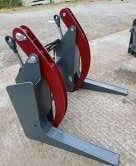

detailing repeated outages caused by falling trees in the same stretch of forestry. “This community has been without power for over three and a half weeks this year alone. We cannot wait for another review or another storm. The time for action is now.”
Senator Scahill concluded by calling on the Minister for Climate, Energy and the Environment to publish the Bill without delay.
“Our people deserve a resilient network. They deserve leadership. Let’s get this Bill published, passed, and implemented before the next storm hits,” concluded Senator Scahill.
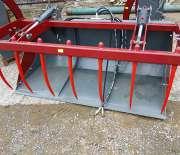
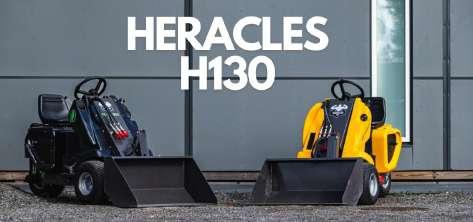











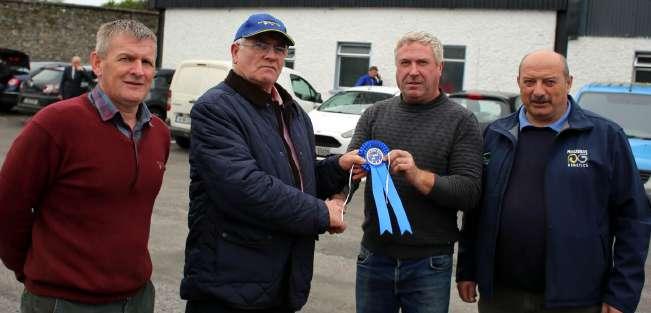
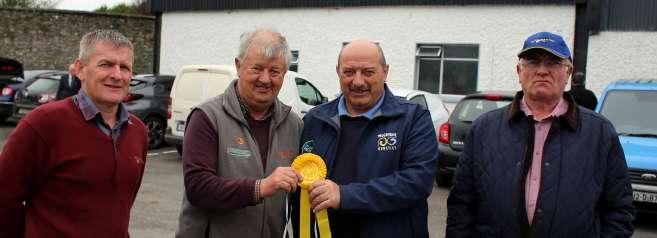
There were over 500 lots presented for sale on Thursday last, October 9th, and aided by improved weather conditions and better quality stock, trade was improved all round.
The heifer ring witnessed stores fetch up to 7.40 a kilo, with heavier lots making up to €3320. The weanling rings, with some superb quality calves on offer, witnessed the bulls peak at 8.22 a kilo, while the heifer weanlings make up to 6.60 a kilo. The dry cow ring had a top price of €3590, while cows with calves at foot made up to €3500 and springers €2540. The runner ring recorded a top price of 7.44 a kilo for a Ch bull calf.
Heifers, sample prices: Lim 400kg €2520, Lim 385kg €2320, Ch 390kg €2150, BBx 470kg €3480, Lim 480kg €2700, Ch 630kg €3320, Lim 725kg €3300, Ch 590kg €3100, Ch 555kg €2980, Ch 590kg €3080, and Ch 490kg €2540.
Dry cows, sample prices: Ch 935kg €3590, AA 825kg €3300, Lim 715kg €3070, Lim 740kg €2990, AA 780kg €3020, Fr 450kg €1290, Fr 465kg €1290, and Sim 710kg €2750.
Runners, sample prices: Ch male 260kg €1930, AA male 265kg €1550, Lim male 245 kg €1500, Ch male 280kg €1800, and Ch male 240kg €1450.
Weanling bulls, sample prices: Ch 275kg €2260, Ch 295kg €2220, Ch 295kg €2190, BBx 275kg €2000, Lim 295kg €1920, Ch 360kg €2960, AA 290kg €1580, and Ch 300kg €2010.
Weanling heifers, sample prices: Ch 295kg €1810, Ch 265kg €1760, Lim 285kg €1710, Ch 330kg €2180, Ch 340kg €2140, Lim 340kg €2120, and Ch 310kg €2080.

At the bullock sale held on Monday last, October 6th, there were over 200 lots presented, with stores making up to 6.25 a kilo and heavier lots making up to €3380 with a good clearance taking place. Sample prices: 490kg €2980, Ch 475kg €2940, Lim 540kg €3380, Lim 500kg €3100, Ch 505kg €3000, Lim 580kg €3100, AA 735kg €3380, Lim 680kg €3340, Lim 655kg €3140, and Ch 610kg €2980. Sales continue at Castlerea Mart on Saturdays
